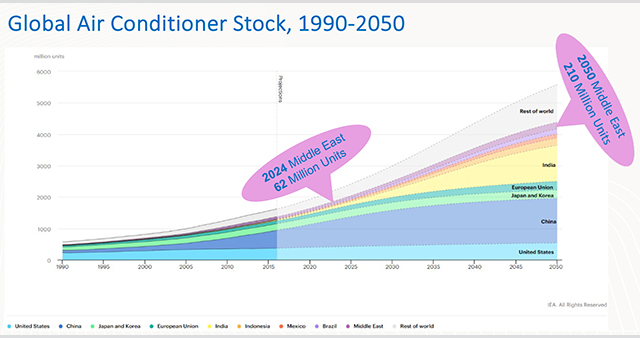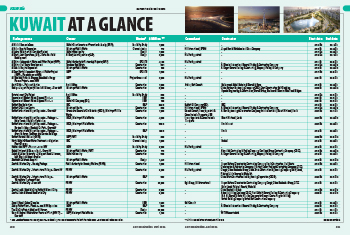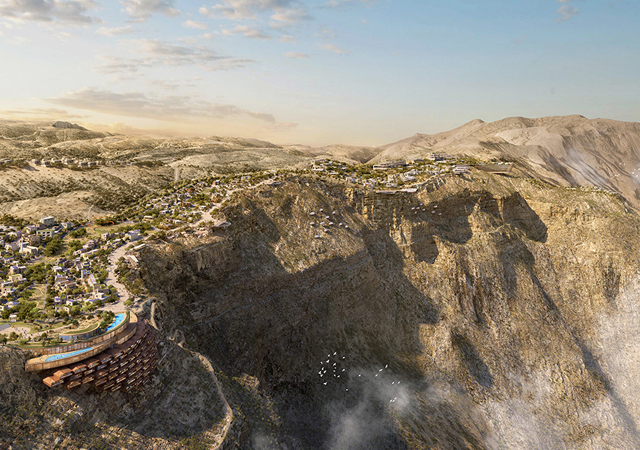

AS Dubai got 2014 off to a flying start by setting off half a million fireworks and blasting its way into the Guinness books yet again with the record-breaking spectacle, the construction industry too would have been raising their glasses in cheer and to the promise of good times, now that the city of superlatives is back in business.
For, following its successful bid to host the World Expo 2020 last November, Dubai has been witnessing a surge in new development projects. As the emirate prepares to welcome around 25 million international visitors during the event that showcases technology, architecture and culture, billions will be spent on new infrastructure not just to host the six-month-long exhibition, but also the numerous hotels, commercial complexes and associated infrastructure to support it.
Expo 2020 is set to boost the economy which is projected to have an annual average growth of 6.4 per cent over the next three years. It is also expected to create more than 277,000 job opportunities, most of which will be within the construction and hospitality sectors. The investment in infrastructure is also set to boost the industrial and logistics sectors in the emirate.
The award of the Expo 2020 has already started translating into more project launches and awards, from both the public and private enterprises.
The focus of attention is on major infrastructure projects near Dubai World Central which will host the event, including the expansion of Al Maktoum International Airport, extension of the Dubai Metro Red Line to the exhibition zone of Expo 2020, extension of the Dubai Metro Green Line, and constructing the second phase of the Dubai Tram project.
After a slowdown during the global financial crisis in 2008, the construction sector in Dubai started picking up in 2013 and the expo win will certainly translate into exponential growth over the next few years. Property prices in Dubai have already started increasing, between 15 per cent to 45 per cent depending on the area and the amenities offered.
During the first half of last year, the emirate recorded real gross domestic product (GDP) growth of 4.7 per cent, the fastest in six years.
According to a report by Jones Lang LaSalle (JLL), 2013 saw the recovery of all sectors of the Dubai real estate market. The performance of all the sectors was, however, not similar. While the residential, retail, hotel and industrial sectors witnessed strong and relatively broad-based growth, the recovery of the office sector remained more selective and concentrated in a few prime locations, the report stated.
The market for retail space is also picking up following years of flat pricing and shelved projects. According to JLL, this year will see an additional 36,000 sq m of retail space enter the market. Most of this will be in community and neighbourhood malls including the Jumeirah Park Community Centre and the Discovery Gardens Retail Centre by Nakheel, the Beach by Meraas and the extension of Mall of the Emirates.
It is estimated that around 471,000 sq m of new retail space will enter the Dubai market by end of 2016. This includes the second phase of Dragon Mart, the Agora Mall in Jumeirah, the expansion of Ibn Battuta Mall, Phase Two of The Avenue and the expansion of Dubai Mall.
Dubai’s hospitality offering is also set to expand significantly. This year alone, almost 5,500 additional rooms are scheduled for completion. Hotels nearing completion include the Sofitel Dubai Downtown, the Intercontinental Dubai Marina, the Double Tree Hilton Barsha, the Phase Two of JW Marriott Marquis in Business Bay and the Palazzo Versace.
Some of the hotel developments announced recently are Damac Towers by Paramount, a new luxury hotel and serviced residences project being developed by Damac Properties in collaboration with Paramount Hotel and Resorts (see Page 62), the Movenpick Hotel on Palm Jumeirah, the Tenora Hotel Apartments in Dubai World Central and the Opus Hotel in Business Bay.
Infrastructure
 |
|
Al Habtoor City ... featuring three world-class hotel brands from Starwood. |
With the surge in infrastructure projects, Dubai’s Roads and Transport Authority (RTA) has been allocated a total expenditure budget for 2014 of Dh7.03 billion ($1.9 billion), with the approved projects budget estimated at Dh3.62 billion ($985.57 million) for constructing around 99 projects, according to Mattar Al Tayer, chairman of the board and executive director of the RTA.
One of its most prestigious projects is the Dh2-billion ($544.5 million) Dubai Canal which will link the Business Bay with the Arabian Gulf. Work on the first phase of the project started last September (see Page 60). The RTA has also selected Meydan Group and Meraas Holding to develop real estate projects around the 3-km canal.
In 2014, the RTA will complete several projects which are currently in progress, and undertake a host of new ones. Among the projects to be completed this year is the Dubai Tram, which has a track extending 11 km along Al Sufouh Street, the initial phase of which is expected to be opened in November (see Page 67).
By the end of this year, the RTA is expected to award a contract for constructing Etihad Bridge near the Dubai Creek Park, Dubai Courts at Bur Dubai, and near Deira City Centre and the Dubai Golf Club at Deira side.
Etihad Bridge, which will replace the existing Floating Bridge, comprises 12 lanes (six in each direction), in addition to a footpath in each direction. The bridge, which measures 61.6 m in width and has an arch that rises 100 m, is set to provide free traffic movement and will allow free marine navigation as it rises 15 m above the creek water level and has a 400-m-wide navigation line.
The RTA will also undertake the construction of two projects worth a total of Dh1 billion ($272 million) in the Godolphin and Zabeel areas as part of the Parallel Roads improvement programme. Work on the project in the Godolphin area is expected to start in last quarter of this year and is targeted for completion in about 30 months at a cost about Dh900 million ($245 million). The project aims to support the existing roads in the Business Bay district, and provide entry and exit options for the area along Sheikh Zayed and Al Khail roads.
Work in the Zabeel area – the Eastern Parallel Roads project – valued at Dh100 million ($27.2 million) is set to start for completion in seven months. Other projects announced recently by the RTA include the Jumeirah Corniche Development and the entrance project to Bluewaters Island (see UAE Focus).
Mega projects
 |
|
|
Among the largest mixed-use projects is the Dh11-billion ($3 billion) Al Habtoor City, a huge residential and hospitality development under construction on Sheikh Zayed Road. Being developed by the Al Habtoor Group, the project will incorporate more than 3,000 hotel and residential units on one plot.
The 10-million-sq-ft development, which is fast rising on an approximately 1 million sq ft plot, will feature three world-class hotel brands from Starwood – including the first St Regis in Dubai, W Dubai Sheikh Zayed Road and Westin Dubai-Sheikh Zayed Road.
It will also include a permanent Franco Dragone Entertainment Group water-themed production exclusively choreographed for the development; three residential towers incorporating 1,460 luxury apartments, 11 penthouses, including two VIP penthouses over a four-storey podium, a tennis academy and clubhouse with eight tennis courts including one covered air-conditioned court and a classical French-style landscaped garden.
Another mega project is the Dh6-billion Bluewaters Island. Located near the Jumeirah Beach Residence and being developed by Meraas Holdings, the project will include retail, residential, hospitality and entertainment zones and will house the ‘Dubai Eye’, the world’s largest Ferris wheel.
Meraas Holding is also developing a Dh10-billion ($2.72 billion) destination that focuses on delivering a multi-faceted leisure and entertainment experience to residents and tourists. Located at Jebel Ali, the project will feature five distinct theme parks based on movies, animals and fun characters that is expected to appeal to all demographics. Dubai Adventure Studios, the first phase of the development which was announced by Meraas in December 2011, will anchor the new destination and is expected to be completed this year.
Dubai will also be home to the multi-billion-dollar Mohammad Bin Rashid (MBR) City. Located between Emirates Road, Al Khail Road and Sheikh Zayed Road, the project comprises four key components. The first focuses on family tourism and will include a park designed to receive 35 million visitors and a family centre for leisure and entertainment set up in collaboration with Universal Studios. There will be over 100 hotel facilities to meet the needs of visitors.
The second component, focusing on retail, will feature the largest shopping mall in the world – the Mall of the World. The third will include the largest district for arts galleries in the Middle East and Africa (Mena) region. The fourth component will see the development of a unique area that will provide an integrated environment for entrepreneurship and innovation in the region.
The new city will also include the Mohammed bin Rashid Gardens and will be connected to Downtown Dubai and Business Bay through a crossing named the Cultural Crossing.
A joint venture between Meydan and Sobha Group is developing Mohammed Bin Rashid City – District One, which involves transforming an area of 4 million sq m within the MBR City into an exclusive destination of key leisure and retail attraction points surrounded by spacious residential communities. It will be the closest residential villa and green space development to the Burj Khalifa.
With a market value of Dh21 billion ($5.7 billion), the development will have 1,500 luxury villas, a 350,000-sq-m water park, the largest crystal lagoon in the world with 7 km of lagoons and man-made beaches, retail zones, leisure and sports attractions. The project, which will be delivered in four phases, will be completed in six to eight years.
Meanwhile, Dubai Holding and Emaar Properties are jointly developing The Lagoons, a waterfront city within the MBR City. The master development, which will be over three times the size of Downtown Dubai, will cover an area of 6 million sq m.
The centrepiece of the development will be the Dubai Twin Towers, a mixed-use development, which is envisaged to join the rank of the world’s most prestigious skyscrapers.
The fully integrated community will have a central business district, an entrepreneurial zone, cultural amenities, residences, premium and affordable luxury hotels, educational facilities, healthcare centres, a waterfront shopping mall and a wide range of leisure choices. All these key components of this world-class development are designed as inter-connected districts, around waterfronts and green boulevards.
The Lagoons stretches from the banks of the Dubai Creek, through central parcels of land linked to Al Khail Road and across Ras Al Khor.
Another striking project located close to the MBR City is the Dubai Design District (d3), where construction work is under way on the Dh4-billion ($1.1 billion) first phase. Located at the core of the 15.5-million-sq-ft site, this phase includes state-of-the-art offices and workshop spaces, which are expected to be ready for tenants in early 2015.
The second phase of the development will focus on d3’s stunning waterfront area, according to the master developer Tecom Investments. This will feature substantial food and beverage, retail and entertainment elements to ensure it operates 24/7. By providing visitors with round-the-clock activities and facilities, d3 aims to help achieve Dubai’s Tourism Vision 2020 goals of attracting 20 million visitors and Dh300 billion ($81.7 billion) in tourism revenues per year by 2020. Once complete, d3 will be a world-class creative community that promotes and nurtures emerging regional design talent, as well as providing a home to the world’s leading brands (see UAE Focus).
Meanwhile, Downtown Dubai continues to evolve and host some of the iconic
developments in the emirate. Last month, Emaar Properties announced plans for Dubai Opera, a 2,000-seat multi-format venue for opera, theatre and concerts within The Opera District, the company’s newest development in Downtown Dubai. The Opera District will also feature luxury hotels, elegant residential and serviced apartments, a retail plaza, waterfront promenades, recreational spaces and parks (see UAE Focus).
 |
|
Dubai continues to see the rise of stunning skyscrapers. |
Emaar Properties has also been spearheading other prime developments within this area. It recently awarded a contract worth $352 million to UK-based construction group Balfour Beatty to create a fashion avenue in Dubai, linking the Burj Khalifa and Dubai Mall. The project, which will extend the Dubai Mall and connect it to the 830-m-tall Burj Khalifa, is expected to add 100 stores and increase the footfall to 100 million shoppers a year.
Earlier this year, Emaar Properties launched two mega projects in Downtown Dubai. These include Boulevard Point in Downtown Dubai, which will feature 297 residences across 63 storeys encompassing one- to three-bedroom residences that are expected to raise the benchmark in distinctive urban luxury; and a second serviced residence project under the upscale hotel concept Vida brand following the successful launch of Vida Residence, The Hills.
The 57-storey Vida Residence Downtown Dubai, to be serviced by Vida Hotels and Resorts, features 320 units, including one-, two-, three- and four-bedroom serviced apartments. It will be linked directly to the Vida Downtown Dubai hotel via an air-conditioned glass bridge, giving residents seamless access to the world-class property.
Among other mega developments, last year Nakheel unveiled three sustainable, innovative waterfront destination developments that will bring a host of new, world-class tourism, cultural, business and residential facilities to Dubai.
The projects include the transformation of four existing islands of Palm Deira into a 16-million-sq-m mixed-use destination development; the creation of a boardwalk covering the entire 11 km length of Palm Jumeirah’s crescent; and an exclusive beach club and park, also on The Palm.
The Palm Deira project will add over 40 km to Dubai’s existing coastline. Besides hotels, resorts and serviced apartments, the development will also feature a night market designed in the style of an Arab suq having more than 1,400 retail units and restaurants and anchor stores.
There will be an amphitheatre with a capacity 30,000 people; a creek marina to accommodate large yachts and a range of additional marinas offering mooring facilities directly outside residences.
Meanwhile, at the Palm Jumeirah, Kuwait-listed IFA Hotels and Resorts is to add 300 units within a new Dh1-billion ($272 million) development that is inspired by the fashion, glamour and jet-set lifestyle of Miami Beach. The project, known as The 8, will be located on the Palm Jumeirah’s west crescent and will include two- and three-bedroom apartments, townhouses and penthouses across its eight storeys. There will also be one-, two- and three-bedroom hotel apartments besides a presidential suite.
Another hotel being built on the Palm Jumeirah is the Dh3.67-billion ($1 billion) Viceroy Dubai Palm Jumeirah, a luxury residential and hospitality project being developed by Skai Holdings, the Dubai-based real estate investment firm. It will offer 479 large rooms and suites and 222 signature Viceroy residences with breathtaking views of the Arabian Sea.
Other projects
• Dubai Multi Commodities Centre (DMCC) is developing the world’s tallest commercial tower named Burj 2020 – the height of which has not been disclosed. Construction will start next year and will be completed by 2020. Burj 2020, to be built on a plot located on the southern side of the Jumeirah Lakes Towers master community, close to Jumeirah Island and Jumeirah Park, will be the centrepiece of the DMCC Business Park, which comprises more than 12,000 sq m of retail space, low-rise commercial space and a high-end hotel, sports facilities, large park areas and multi-storey car parking.
• Deyaar Development has started work on the Dh900-million ($245 million) The Atria project. Located in the Business Bay area, the project comprises two 30-floor towers – one residential tower and the second for serviced apartments. The Atria will feature 350 serviced apartments and 219 residential apartments (see Page 71).
• MAG Group is developing a 1-million-sq-ft mixed-use project in Dubai Healthcare City at an estimated cost of Dh800 million ($217.8 million). The project will include two hospitals, a clinic and a four-building residential complex.
• Arabtec will build three mixed-use towers in Business Bay, and six new hotels and serviced apartment towers in Aljaddaf district, adjacent to the Culture Village development. Occupying a total plot area of 300,000 sq ft and offering a built-up area of 3 million sq ft, these include a five-star hotel to be managed by Swissotel, a four-star hotel managed by Hilton, a three-star hotel managed by Park Inn, as well as three serviced apartment buildings to be operated by Fraser Suites.
• The Dubai Silicon Oasis Authority (DSOA) has launched Silicon Park, the first integrated smart city project to be built at a cost of Dh1.1 billion ($300 million) spanning an area of 150,000 sq m. Work has commenced and the project will be completed by Q4 of 2017 (see UAE Focus).




















_0001.jpg)


.jpg)
















.jpg)








.jpg)









